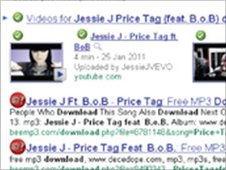Don't click that! It's the NaughtyNet!
Just what the internet needs: a red light district

Sometimes, I love my job - and today's one of those days, because the Performing Right Society has found a new way to fight piracy.
In future, when you search, the results will tell you which of two internets a particular page comes from: the NiceyNet, or the NaughtyNet.
The problem, the PRS reckons, is that people aren't always aware that they're downloading from dodgy sites. Pirate flags, misspellings, movies that haven't even reached the cinemas, cracked software and names such as Pirate Pete's Piratey Page of Pirated Pop are too subtle - so the PRS wants to add a red light to your search results.
What's next? A man with a flag?
Inspired by traffic lights, the PRS proposes that search engines should put a green light next to legitimate results and a red one next to infringing ones - so the next time you Google for free copies of records that aren't even in the shops yet, you'll know that they're not coming to you via iTunes.
I think I've found two flaws. One, you need to be several kinds of dumbass if you don't realise you're pirating music. And two, nobody pays attention to traffic lights.
For proof, just hail a taxi.
Sign up for breaking news, reviews, opinion, top tech deals, and more.
Taxis and torrents
If you were to show me statistics proving that almost all piracy is carried out by taxi drivers, I wouldn't be surprised. I've come to dread the "so, what do you do for a living?" question, because the follow-up is inevitably about transcoding video files downloaded from dark corners of the internet.
Talking about transcoding is enough of a pain when you're getting paid for it; doing it while you're drunk as a lord, experiencing the sort of G-forces fighter pilots balk at while the driver runs yet another red light is even worse.
The driver isn't running the red lights because he's ignorant; he's doing it because he doesn't want to stop. And he isn't downloading dodgy files because he thought he was on HMV.com; he's doing it because he doesn't want to pay.
This isn't the first time the PRS has asked search engines to change things, and I've got some sympathy for them: unlike other organisations, they're not stomping around demanding that we block half of the internet or electrocute anyone with an illegal Rihanna MP3 - or at least if they are, they're not doing so publicly.
Previous PRS requests have been perfectly reasonable. The organisation successfully persuaded Google to change its autocompletion so that piracy-related terms didn't appear automatically, which seems fair enough to me: search engines probably shouldn't be in the business of saying "hey! It looks like you're trying to break the law! Let me help with that!"
The only benefit I can think of from a traffic light scheme is making it easier for parental control software to filter out the dodgy download sites, but The Kids will find ways around that.
Real-world traffic lights don't stop all drivers, and online ones won't stop downloaders.

Contributor
Writer, broadcaster, musician and kitchen gadget obsessive Carrie Marshall has been writing about tech since 1998, contributing sage advice and odd opinions to all kinds of magazines and websites as well as writing more than twenty books. Her latest, a love letter to music titled Small Town Joy, is on sale now. She is the singer in spectacularly obscure Glaswegian rock band Unquiet Mind.